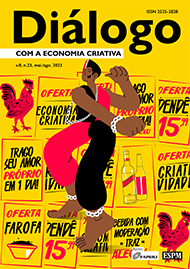Creative economy in the face of the complexity paradigm
DOI:
https://doi.org/10.22398/2525-2828.823184-201Keywords:
Creative economy, Creative industries, Complexity, Cultural management, Deviant creativityAbstract
Objective: To discuss Creative Economy based on the complexity paradigm. Therefore, thinking about creative economy, based on this paradigm, is part of the search to establish convenient principles of intelligibility in order to apprehend the complexity of the way ideas are organized. Provocations: However, it would be possible that, at the end of this journey, something like dissent on the part of conservatives could be seen. Conservatives not because they are concerned about preserving traditions, but above all because they are concerned about refuting any possibility of the emergence of a new tradition. Conclusion: The complexity paradigm, thus, shows the emergence of deviant creativity in its possibilities of autonomy. In such autonomy, a dialogical game of pluralisms, of the multiplication of gaps and ruptures is intrinsic in the existing creative determinations. Therefore, deviant creativity can point out the emergence of new creative paradigms, which can destabilize institutionalized creativity.
References
ABRANCHES, S. A era do imprevisto: a grande transição do século XXI. São Paulo: Companhia das Letras, 2017.
APPADURAI, A. Modernity at large: cultural dimensions of globalization. Mineápolis: University of Minnesota Press, 2003.
CORSANI, A. Elementos de uma ruptura: hipótese do capitalismo cognitivo. In: COCCO, G.; PATEZ, G.; SILVA, G. (org.). Capitalismo cognitivo: trabalho, redes e inovação. Rio de Janeiro: DP&A, 2003. p. 15-32.
DAVIS, S.; MEYER, C. Blur: a velocidade da mudança na economia integrada. Rio de Janeiro: Campus, 1999.
GIDDENS, A. As consequências da modernidade. São Paulo: Editora da Unesp, 1991.
GREFFE, X. A economia artisticamente criativa: arte, mercado, sociedade. São Paulo: Iluminuras/Itaú Cultural, 2015.
HAN, B.-C. Hiperculturalidade: cultura e globalização. Petrópolis: Vozes, 2019.
HALÉVY, M. A era do conhecimento: princípios e reflexões sobre a noética no século XXI. São Paulo: Editora da Unesp, 2010.
HARTLEY, J. (org.). Creative industries. Oxford: Blackwell, 2005.
LÉVY, P. Filosofia world: o mercado, o ciberespaço, a consciência. Lisboa: Instituto Piaget, 2000.
MORIN, E. Ciência com consciência. Rio de Janeiro: Bertrand Brasil, 2005.
MORIN, E. Conhecimento, ignorância, mistério. Rio de Janeiro: Bertrand Brasil, 2020.
MORIN, E. Entender o mundo que nos espera. In: MORIN, E.; VIVERET, P. (org.). Como viver em tempos de crise? Rio de Janeiro: Bertrand Brasil, 2013. p. 7-27.
MORIN, E. O método 1: a natureza da natureza. Porto Alegre: Sulina, 2016.
MORIN, E. O método 2: a vida da vida. Porto Alegre: Sulina, 2015.
MORIN, E. O método 4 as ideias: habitat, vida, costumes. Porto Alegre: Sulina, 2011.
POTTS, J.; CUNNINGHAM, S. Quatro modelos de indústrias criativas. In: VALIATI, L. (org.). Economia da cultura e indústrias criativas: políticas públicas, evidências e modelos. São Paulo: Itaú Cultural; WMF Martins Fontes, 2023.
SENNETT, R. The uses of disorder: personal identity and city life. Londres: Faber and Faber, 1996.
SHIACH, M. Um “acordo setorial” e um precariado criativo: moldando a política de economia criativa no Reino Unido desde 2010. In: VALIATI, L. (org.). Economia da cultura e indústrias criativas: políticas públicas, evidências e modelos. São Paulo: Itaú Cultural; WMF Martins Fontes, 2023. p. 13-31.
VALIATI, L. (org.). Economia da cultura e indústrias criativas: fundamentos e evidências. São Paulo: Itaú Cultural; WMF Martins Fontes, 2022.
VAN DIJCK, J. La cultura de la conectividad: una historia crítica de las redes sociales. Buenos Aires: Siglo Veintiune, 2016.
VILIATI, L.; CORAZZA, R. I.; FLORISSI, S. O marco teórico-conceitual da economia da cultura e da economia criativa: uma revisão de contribuições selecionadas e de seus pressupostos. In: VALIATI, L. (org.). Economia da cultura e indústrias criativas: fundamentos e evidências. São Paulo: Itaú Cultural; WMF Martins Fontes, 2022. p. 113-161.
WALDROP, M. M. Complexity: the emerging science at the edge of order and chaos. Nova York: Touchstone, 1992.
ZUBOFF, S. A era do capitalismo de vigilância: a luta por um futuro humano na nova fronteira de poder. Rio de Janeiro: Intrínseca, 2021.
Downloads
Published
How to Cite
Issue
Section
License
Copyright (c) 2023 Romilson Marco dos Santos

This work is licensed under a Creative Commons Attribution-NonCommercial-NoDerivatives 4.0 International License.
The copyright for articles published in this journal belongs to the author, with first publication rights to the journal.
We emphasize that the responsibility for the articles is exclusive to the author(s) and does not necessarily reflect the opinion of the Editors or ESPM.








